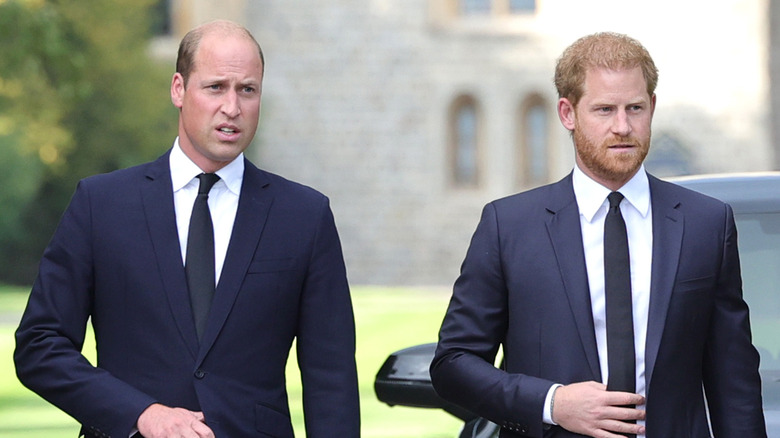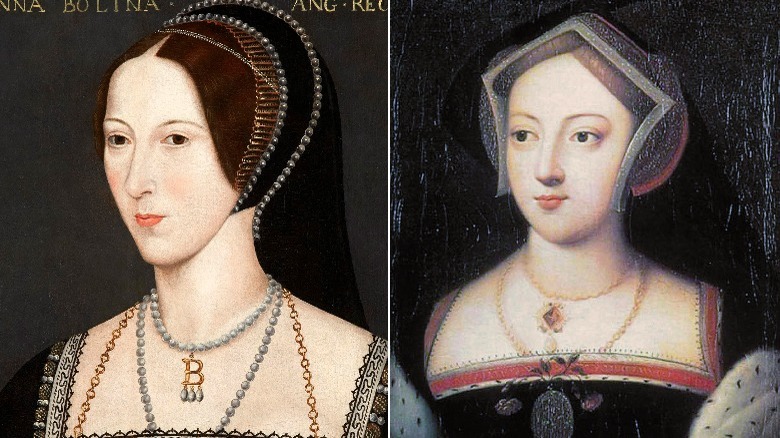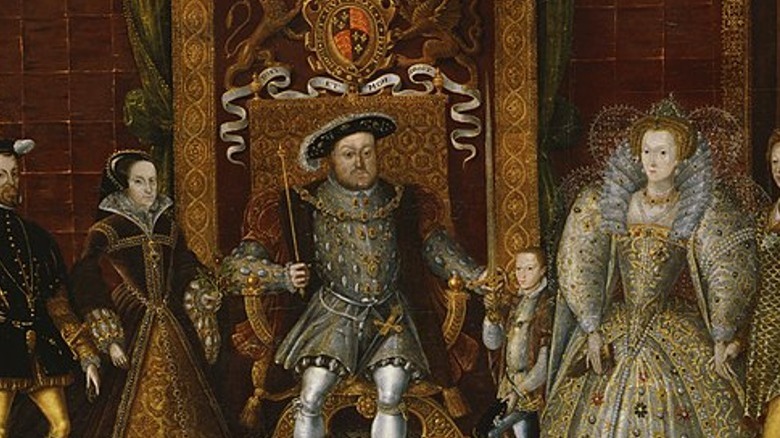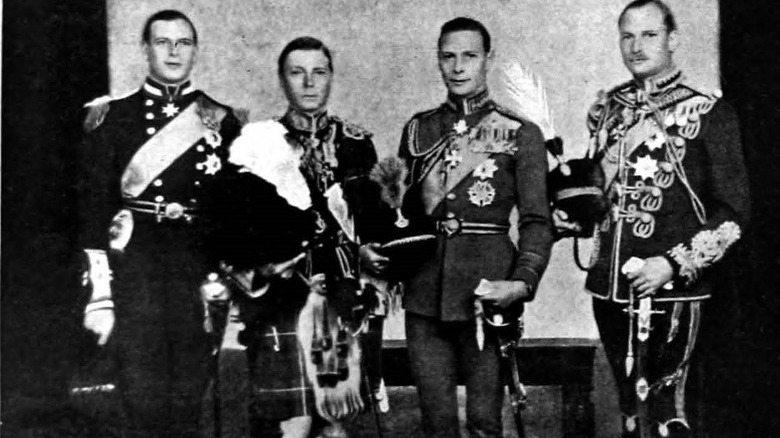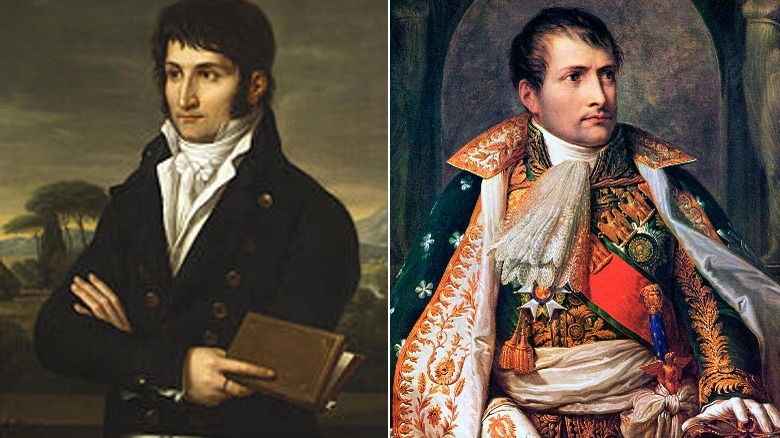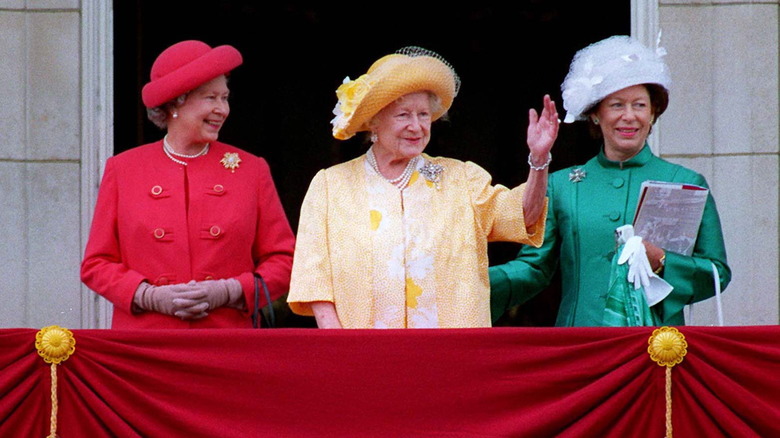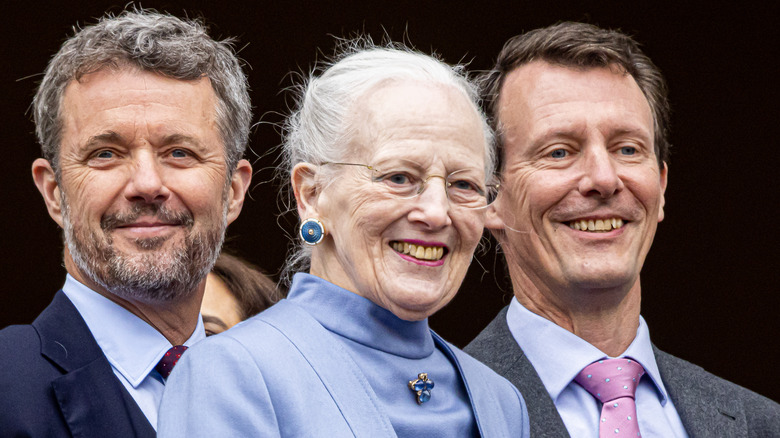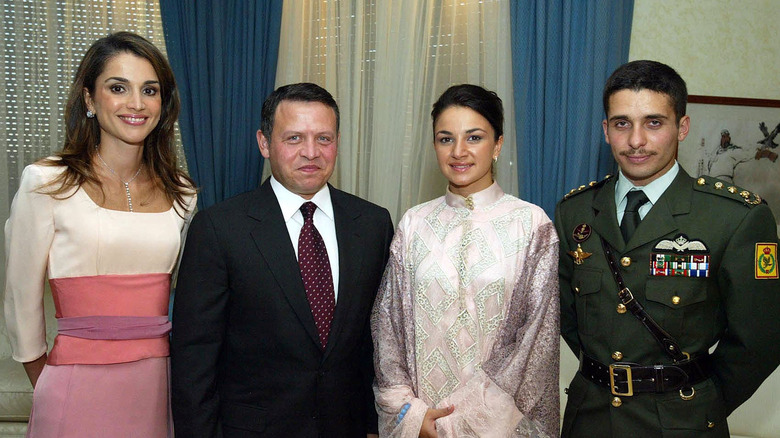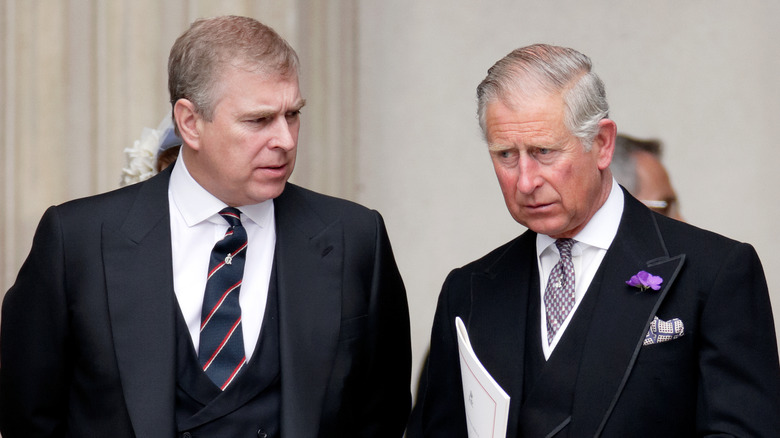Prince William And Prince Harry Aren't The Only Royal Siblings Who Had Rocky Relationships
You see the elegant dresses, the crown jewels, and the beautiful ceremonies and think it must be amazing to be royalty. But as Prince William and Prince Harry have proved multiple times, life in the monarchy isn't easy, especially for siblings.
Given their elevated status, every move of the royal siblings is scrutinized. Typical squabbles turn into huge events that lead to news headlines. From the way they treated each other at the coronation to Williams' hurt about Prince Harry's book, you can see every argument plastered across the pages of your favorite online news website. However, Harry and William are far from the only royal siblings to fight with one another. And with some royal feuds throughout history ending in death, the fact that these two princes might not be on speaking terms seems tame.
When it comes to complicated relationships, Facebook doesn't have anything on royal families. From sucker punches to falling out with the family to leading a rebellion, many royal siblings throughout history have had rocky relationships.
The famous Boleyn sisters and their relationship with Henry VIII
Royal feuds are never a good thing and garner a lot of public attention. However, beyond the name-calling and tell-all books, modern royal rivalries are pretty tame compared to some of the seedier royal rows throughout history. One of the most famous rocky sibling relationships was that of the Boleyn sisters.
While little is known about Anne and Mary Boleyn's childhood, their relationship with King Henry VIII caused scandal and forever assured their place in history. By all accounts, Mary Boleyn was the first to become a mistress to Henry VIII due to his filing of the dispensation for marriage with Anne Boleyn, showing that he slept with a woman in her family, according to The Anne Boleyn Files. However, Anne swiped the love of Henry VIII away from Mary and ended up marrying him. The sisters didn't meet much after that; Mary's secret marriage and pregnancy in 1534 led to her exile.
Anne Boleyn "was someone who, on her worst day, was Henry's intellectual equal. On her average day, she was more intelligent than him," according to historian Gareth Russell (via RadioTimes.com). Yet, her inability to produce a male heir led to her ultimate downfall and death by beheading. On the other hand, Mary lived out her days on Boleyn's property before dying in her 40s. Anne Boleyn's child, Elizabeth, brought about the next legendary royal rumble.
Bloody Mary and Elizabeth I fight for throne nearly led to death
The history of the Tudor family is full of royal intrigue, scandal, and, most of all, legendary sibling rivalries. When it comes to scandals, you only need to look at the life of Elizabeth I. Her disagreement with Mary Tudor almost led to death.
Princess Mary was the apple of her father's eye until the birth of Princess Elizabeth I. King Henry turned away from his daughter Mary, taking away her title as a princess and making her a lady, according to Tudors Dynasty. However, that all changed with Anne Boleyn's fall from grace and death. Elizabeth I was removed from the court for a time. Once Elizabeth I was brought back, the two got along amicably. However, Catholic Mary's rocky rise to the throne would throw her relationship with Protestant Elizabeth into turmoil over fear that she would take her place.
There was even a plot (Wyatt's Rebellion) to overthrow Mary, but it never saw fruition. Rather than killing Elizabeth I, Mary imprisoned her, but ultimately the two restored their relationship, and Elizabeth was named queen upon Mary's death. When you add the throne, it creates a lot of chaos for siblings; Just ask Prince Edward and George.
Royal rivalry of Edward VIII and George VI
The rocky relationship between Edward VIII (nicknamed David) and George VI (nicknamed Bertie) is the stuff that legends are made of. Their relationship was fraught with turmoil that could have changed the course of history.
According to many sources, the difference between Edward and George was between night and day. It's quoted in Sarah Bradford's book "The Reluctant King: The Life and Reign of George VI, 1895-1952" that it was "like comparing an ugly duckling with a cock pheasant." While the brothers had normal skirmishes during their youth, the true rivalry began when Edward started a relationship with Wallis Simpson, a divorcee. In the end, this relationship led to Edward abdicating the throne and George becoming the new king. Shocked and hurt by Edward's decision, George stepped up to become king, but it caused a major strain in their relationship.
While George struggled with the duties of a king, his wife particularly loathed Simpson and the turmoil she'd brought to the monarchy, according to Vanity Fair. Additionally, arguments about money, titles, and gossip sparked by Simpson fueled the fire, leading to the brothers barely speaking with one another. However, according to Alexander Larman, author of "The Crown in Crisis: Countdown to the Abdication," "Matters were immeasurably worsened by the fact that Edward, for certain, and Wallis, almost certainly, had Nazi sympathies that compromised their integrity during wartime." Can you imagine how that might have changed the war? Speaking of wars, check out the Bonaparte brothers' up-and-down relationship.
A marriage caused a rift for the Bonaparte brothers
While Napoleon Bonaparte is a household name, his brother, Lucien, isn't as well-known. For the most part, it appears that Napoleon and Lucien had an excellent brotherly bond in the early stages of Napoleon's rise to power. However, unlike his famous brother, Lucien was not interested in military conquests. He found his niche in politics. Lucien didn't believe in his brother's ideology and worked to thwart it several times, causing a few harsh words, but the event that genuinely gummed up their brotherly love was Lucien's multiple marriages. Napoleon wrote a strongly worded letter, "Lucien prefers a disgraced woman, who bore him a child before he had married her, and who was his mistress while her husband was at St. Domingo, to the honour of his own name and family. I can only mourn over such an amount of mental alienation" (via Letters by Napoleon & his Contemporaries).
Since Lucien refused to divorce his wife, Napoleon refused to restore his rights; Therefore, the two were estranged until they reconciled during Napoleon's downfall. Interested in more harsh words and possibly a left hook, check out Elizabeth II's relationship with Princess Margaret.
Sibling squabbles of Queen Elizabeth II and Princess Margaret
To be a sibling is to have a fight or two. While most of these don't get televised, royals live under different standards. Queen Elizabeth II and Princess Margaret were under the microscope of public scrutiny for their entire lives (via Refinery29).
Though one was drawn to duty and the other was trying to find her place in the world, the sisters were always close, aside from the occasional childhood fights. According to royal expert Victoria Arbiter in Queen Margaret: Rebel Without a Crown, "Marion Crawford, their governess, had said they didn't hesitate to argue and fight. Elizabeth apparently had a good left hook, whereas Margaret wasn't shy to bite her sister in return." Typically, you don't associate the Queen of England with a good right hook, but sisters work to bring out the best in you! Although most of the royal fights went under the radar, Margaret's scandalous relationship and proposal from Peter Townsend created waves in the family. This love would cause tension because Peter was older than Margaret, divorced, and a commoner, all of which were looked down on by the monarchy.
Given Margaret's title and the expectations of royalty, she eventually decided against marrying Peter, even though Queen Elizabeth created a compromise to save their relationship. While Queen Elizabeth II's squabbles might not have been epic, they made quite the scandal. However, another queen's family feud led to death.
Historic feud of Cleopatra VII and Ptrolemy XII
Some rivalries are here today and gone tomorrow. Given the high expectations of royalty, it makes sense that every moment of their fights and reconciliations is documented. However, the yelling matches and even fistfights between Margaret and Elizabeth II had nothing on Cleopatra VII and her siblings.
Known for her prowess as a ruler, Cleopatra is most famously linked with Julius Caesar. However, her road to royalty was full of death. As was common in 51 BCE, the beautiful and intelligent Cleopatra married her brother Ptolemy XIII, and both ascended to the throne when she was just 18 years old. However, Ptolemy didn't like sharing the limelight or power, so he exiled his sister shortly after they became rulers. Not satisfied with her brother's treatment, she gained the support of Rome and started a fight with her sibling for power. Eventually, Ptolemy XII died by drowning. Cleopatra didn't just stop with getting rid of Ptolemy XII. She went on to marry and kill her brother Ptolemy XIV and kill her sister Arsinoe since they were rivals that could take away her power.
In ancient times, power reigned, and being in the way could lead to your death. Thankfully, modern royal feuds, like that of the Danish royal siblings, led to bad-mouthing and possible removal from the monarchy.
Danish Prince Frederik and Prince Joachim family squabble
While the court of the Danish monarchy is pretty tame compared to its British counterpart, Queen Margrethe's children, Prince Joachim and Prince Frederik, have found their way into the spotlight in recent years due to disputes over royal pay and titles. Prince Frederick is in line for the throne, but his brother, Prince Joachim, has set his status with the royal family as "complicated." Joachim and his family live in Paris rather than with the royal family.
Even though Joachim isn't contributing to the monarchy, he's still making a substantial living, according to Now to Love. In addition to inciting negativity from commoners, the publication hints that Prince Frederik and his family work harder to take up his brother's slack. Further straining the brother's relationship, Prince Fredrik agreed with Queen Margrethe when she decided to strip the titles of prince and princess from Joachim's family. He stated, "I myself am interested in the Danish monarchy staying lean over time, so I, therefore, support my mother's decision, which she has chosen to make" (via People).
"Complicated" is the perfect word to define this royal Danish brotherly relationship. At least Prince Joachim is just voicing his displeasure rather than going after the throne like the prince of Jordan.
King Abdullah and Prince Hamzah rivalry for the throne
Many times, simple disputes or scandals lead to feuds between modern-day royals. The Middle East had a long-simmering family feud between King Abdullah, who became king in 1999, and Prince Hamzah bin Hussein that rapidly escalated when the prince supposedly tried to seize the throne.
In an interview with PBS, the prince accused the king of neglecting the government, and he was put under house arrest for a supposed plan to overthrow the monarchy with the help of others. Prince Hamzah stated the people's "well-being has been put second by a ruling system that has decided that its personal interests, that its financial interests, that its corruption is more important than the lives and dignity and futures of the 10 million people that live here." While Prince Hamzah ultimately denied the allegations of trying to take the throne, he did state that the "country has been stymied in corruption, in nepotism, and in misrule."
The prince apologized to the king and has rarely been seen publicly since the 2022 incident. Jordan isn't the only Asian country with warring siblings. Japanese Emperor Naruhito clashed with his brother Akishino over money, too.
Emperor Naruhito of Japan and his younger brother Akishino difference of opinion
Having a big brother who's destined to rule the country can be daunting — to say the least. Though most modern royal siblings accept the ceremony and regulations set before them, it can be frustrating when you're the younger brother.
Brothers Emperor Naruhito, who ascended the Japanese throne in 2019, and Akishino have stayed, for the most part, out of the news thanks to their excellent relationship. However, the tension between them became apparent when Akishino complained that taxpayers were required to pay for the succession ceremonies rather than the imperial family. He told reporters, "It's a Royal family event, and it is highly religious ...The question is if it is appropriate to use government funds to cover the cost of such a highly religious event" (ABC News). Akishino's public resentment of how the funds were handled highlights the difference in opinions between these brothers.
This argument brought other tensions between the brothers to the forefront, such as Akishino having to wait for marriage due to his older brother not being married. However, the conflict between these Japanese brothers could be seen as more of a simple skirmish compared to the tense relationship between King Charles and Andrew.
King Charles and Andrew royal squabbles
You can't have an article discussing the history of royal siblings with tumultuous relationships without talking about King Charles and his brother Andrew. The discord between these two monarchs runs deep, starting in childhood. King Charles was brought up to be a ruler, while Andrew was given freedoms which often led to poor choices in Charles' eyes.
Their longstanding feud has included everything from open criticism to being excluded from invites to royal events. However, ties to Jeffrey Epstein led to Andrew being stripped of his patronage and military affiliations, according to CNBC. No longer a prince, Andrew is now the Duke of York and doesn't have any royal duties. However, a new conflict has arisen, as Charles has been crowned the new king, requiring Andrew to move out of the Royal Lodge of Windsor. Nevertheless, Andrew was given a prime spot as a display of solidarity between the two at King Charles's coronation.
The rocky relations of the royal brothers might dominate the royal news, but there's a long history of royals lashing out at their siblings. While the lavish lifestyle might be the stuff dreams are made of, living as a royal sibling has always been challenging.
